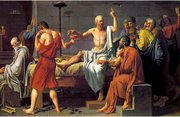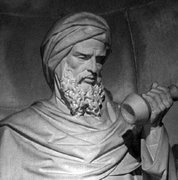'Ethic' is one of the important aspects in human's life, there are many different ideas discusses about ethics, whether it such branch of knowledge or philosophy. However it will be explained here in my project 'The ethics of Plato' and the first chapter is clarifying the different definitions of Ethics among some scholars.
The second chapter will give brief introduction of Plato. Plato is one of the famous philosophers of Greek who considered the ethics to be his research study. And the last chapter is the ethics of Plato, which give more details about Plato and his idea of ethics.
However, may this project be able to grant an addition to our knowledge and valuable.
By, Alfina Hidayah
Chapter One: What is Ethic?
Part One: The Definitions of Ethic
There are many definitions of ethics; according to Concise Oxford English Dictionary it means a set of moral principles: the puritan ethic. Originated from Middle English: from Old French 'ethique' from Latin 'thice' from Greek (he) 'thike' tekhne) '(the science of) morals, based on ethos.[1] And the word ethos means the characteristic spirit of culture, era or community as manifested in its attitudes and inspirations. It derived from Greek means nature, disposition, (plural) customs.[2] According to Arabic language, ethic means 'khuluq', which intend to the similar words around character, behaviour, nature or attitude. And every khuluq relates to 'Khaliq' (the Creator), both are derived from the same letter with different spelling. The first will be read Khuluq (ethic) and the second read Kholiq (the Creator), that in every ethics of people should be connected and based upon the Creator's willing. Because the submission of ethics it's not just relates to human beings but to the Creator as well and to all universe.[3] There are number of terminological meanings of ethics according to some scholars, are:
1. In the Greek philosophical ethics differs from later moral philosophy in ways that reflect the difference between Greek society and modern society.[4] It is Socrates when he talks about moral he believed that all the moral virtues were forms of knowledge; in such a way that when we knew what justice was, it followed that we would be just.[5]
2. Definition of Ibrahim Anis, that ethic is character which tied up in the soul of man, by this will create many actions, good and bad, without any thought and judgment.[6]
3. According Kant, what he was saying about a moral precept is that nothing is unconditionally good except a good will, health, wealth, intellect, are good only in so far as they are used well. But the good will is good. The good will's only motive is to do its duty for the sake of doing its duty. Whatever it does intend to do, it intends because it is its duty.
And there are many other scholars have conversed about ethics.
Chapter Two: Who Is Plato?
Plato he was born in Athena 427 B.CE and died on 347 B.CE, he was a student of Socrates, he concern on his philosophy of ethics and many discovering of sciences which has began with Socrates. He wanted to complete his research on philosophy of ethics, soul or psychology of human beings, and any problems of sciences, physic and metaphysic, the matters of social, the management of education, politics, laws, etc. [7]
Part One: His life
Plato was born around high class family in Athena on 427 B.CE, when he was young he acquainted with a famous philosopher Socrates who was became his teacher and friend. On 399 B.CE Socrates died by the government in his seventy years old, this verdict made Plato insufferable of democrat government. No longer after his teacher died, he left Athena and roves wander about ten to twelve years in unknown places.
On 387 B.CE he went back to Athena and built institution there, an Academy which alive about 900 years. He spent his 40 years in Athena, he taught, wrote the matters of philosophy, and he has a great student 'Aristotle' and Plato was sixty years old, so he was passed away in his seventy years.
Part two: the opus of Plato
Plato has written no less than thirty six books, which discussing about Politics, Ethics, Metaphysics and Theology. 'Republic' is one of his books that written about his ideal thought of social forms. He said the best form of government is aristocrat government, and a leader should be select by the collective agreement and the guardian should select his staffs according to their qualities.
Plato was the first philosopher who considered the women right in political aspect and social, he allowed women to have their chances in political roles. He said that children under responsibility of the state, they should learn any kind of sciences and especially his ideal understanding of the metaphysics.[8] Due to his opus, the idea of an ideal state has influenced broadly to western countries until today.
Chapter Three: The Ethics Philosophy of Plato
The definition of justice as "telling the truth and paying one's debt" is rejected, not only because it may sometimes be right to with hold the truth or not to return what one has borrowed, but because no lists of types of action could supply what Plato is demanding. What he wants to know is what it is about an action or class of actions which leads us to call it just. And he also rejected a definition of justice as "doing good to one's friends and harm to one's enemies".
Socrates does offer us a formula, that justice is that state of affairs in which everyone has regard to his own concerns, this is in it self the answer that was being sought.
Plato tried to show what justice is, first in the state and then in the soul. He outlines a state in which all basic needs are met. Three classes of citizen are required: artisans and labourers to produce the material needs of society; soldiers to defend the state and rulers to organize its social life. He believes that which is not certainly true is that one man is better to stick to one job. And the belief which is certainly false is that men are by nature divided up into men best suited for each of these functions. Plato believes on this point were powerfully resistant by his doctrine of the tripartite soul. The argument about the tripartite soul are independent of those for the tripartite state, but it is necessary for the doctrine of the tripartite state that at least something like the doctrine of the tripartite soul should be true.
The Plato points about desire is that a man can not simultaneously desire to do something and desire not to do it, in the same sense in which a man can not at the same time move in given direction and not move in that direction. He wants to illustrate a distinction between the parts which is the reason, a distinction which apply huge pressure upon some subsequent moral philosophy.
The division of the soul is not just between reason and appetite; there is also the spirited part, which is concerned neither with rational standards of behaviour nor with bodily desires, but with standards of honourable behaviour. And with anger and indignation. And justice of the state belongs not to the desires and wisdom of the superior few, nor to that class, nor to particular relationship between classes but to the society's functioning as a whole.
Justice in the soul is likewise a matter of each part of the soul performing its proper and allotted function. An individual is wise in virtue of reason ruling in him and brave in virtue of the spirited part playing its role. An individual is temperate if his inferior bodily appetites are ruled by his reason. And justice belongs to its total ordering. Moreover, the just man will rarely exist except in the just state, where at least some men, the future rulers are systematically educated in justice. But the just state can not possibly exist except where there are just men; Plato brings the ideal of the philosopher king.
The form of the good is not one among the other forms we think: they belong to the dominion of unchanging existence, the form of the good dwells beyond existence. So it is in the intellectual light given out by the form of the good we grasp the other forms, but we cannot contemplate the form of the good it self.
The ruler of the just state, in whom the rule of reason is present are rational in virtue of an education which has enabled them to apprehend the forms. In the just state the philosopher is king, only he can bring into being and maintain in being state in which justice is embodied both in the political arrangements and in the soul. It follows that the class division of the just society can, as Plato has earlier suggested, be maintained by educating some to be rulers, others to be auxiliaries, most to be ruled; the use of eugenic controls and selection methods is to insure that those fit for the education of rulers receive it.
Plato has three arguments that the just life is happier than the unjust one. The first is that the unjust man sets no curb upon his desires, and so his desires are without limit. But being limitless, his desires can never be satisfied and so he will always be discontented. The second argument is that only the philosopher is in position to contrast the pleasures of reason with those of limitless, appetite and sensuality, for he alone knows both sides. The third depends for part of what it seeks to prove upon the arguments about the forms.
Man can pursue pleasure only if I am pursuing identifiable goals and making choices between alternatives in terms of them. The man who can no longer make choices but passes on heedlessly and inevitably from one action to the next is not a possible normal human type, but rather a compulsive neurotic. [9]
Plato points out that justice is a relation among individuals, depending on social organization; and that in consequence it can be studied better as part of the structure of a community than as a quality of personal conduct.[10] He said that there are only three things worth while in this world: justice, beauty and truth; and perhaps none of them can be defined. And he said viewed that justice means the having and doing what is one's own. A just man is a man in just the right place, doing his best, and giving the full equivalent of what he receives. Justice is effective coordination, such as in individual, justice is the harmonious functioning of the elements in a man, every individual is a cosmos or a chaos of desires, emotions and ideas.[11]
Concise
Durant, Will, The story of philosophy,
Hart, Michael H., Seratus Tokoh yang Paling Berpengaruh dalam Sejarah translated by Mahbub Djunaidi, Dunia Pustaka Jaya, Jakarta, 1982.
Ilyas, Yunahar, Kuliah Akhlaq, LPPI,
Ismail, Mansyavi Abd Rahman, Fi Taarikh al-Fikri al-Falsafi, Daar al-Tsaqafah al-'Arabiah,
MacIntyre, Alasdair, A Short History of Ethics, Routledge,
[1] Concise
[2] Ibid, "Ethos".
[3] Ilyas, Yunahar, Kuliah Akhlaq, LPPI,
[4] MacIntyre, Alasdair, A Short History of Ethics, Routledge,
[5] Ibid, P: 21
[6] Ilyas, Yunahar. Op. Cit., p: 2
[7] Ismail, Mansyavi Abd Rahman, Fi Taarikh al-Fikri al-Falsafi, Daar al-Tsaqafah al-'Arabiah,
[8] Hart, Michael H. Seratus Tokoh yang Paling Berpengaruh dalam Sejarah translated by Mahbub Djunaidi, Dunia Pustaka Jaya,
[9] MacIntyre, Alasdair, Op. Cit., P: 33-47
[10] Durant, Will, The story of philosophy,
[11] Ibid, p: 33




No comments:
Post a Comment